Phone: 604-683-2554 | Email: welcome@gordonhouse.org
World Food Day – A Bite to Eat & A Call to Action

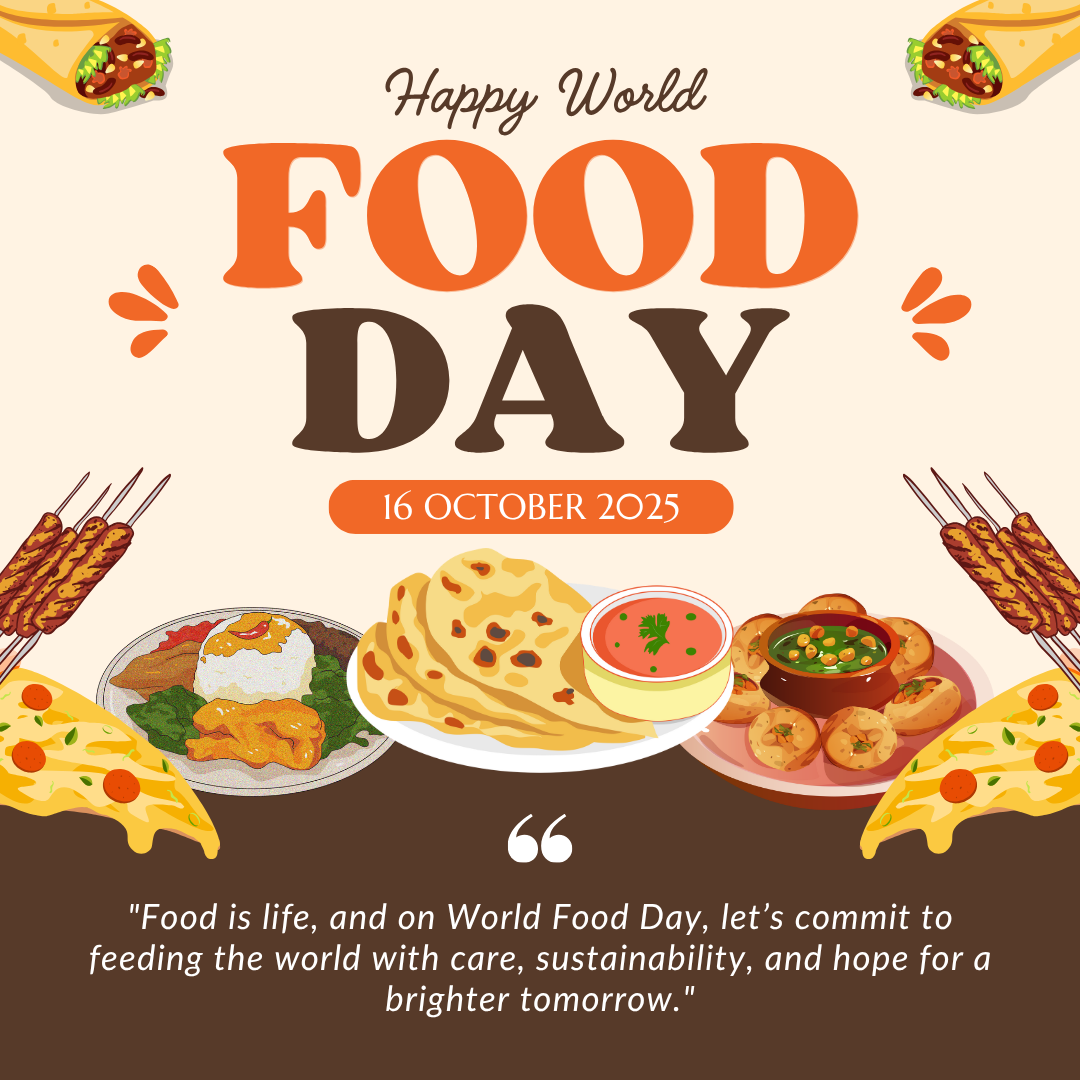
In honour of World Food Day, we’re taking a minute to talk about what food insecurity looks like in our community, innovative policy solutions that are tackling the problem, and ways the City of Vancouver is acknowledging the holiday.
What is World Food Day?
World Food Day (WFD) was founded by the United Nations’ Food and Agriculture Organization in 1945, and has been observed every October 16th since 1981. For those of us who still feel like it’s the year 2000, that’s actually 44 years ago! The event was created to raise awareness of hunger and poverty around the world and inspire global change and action.
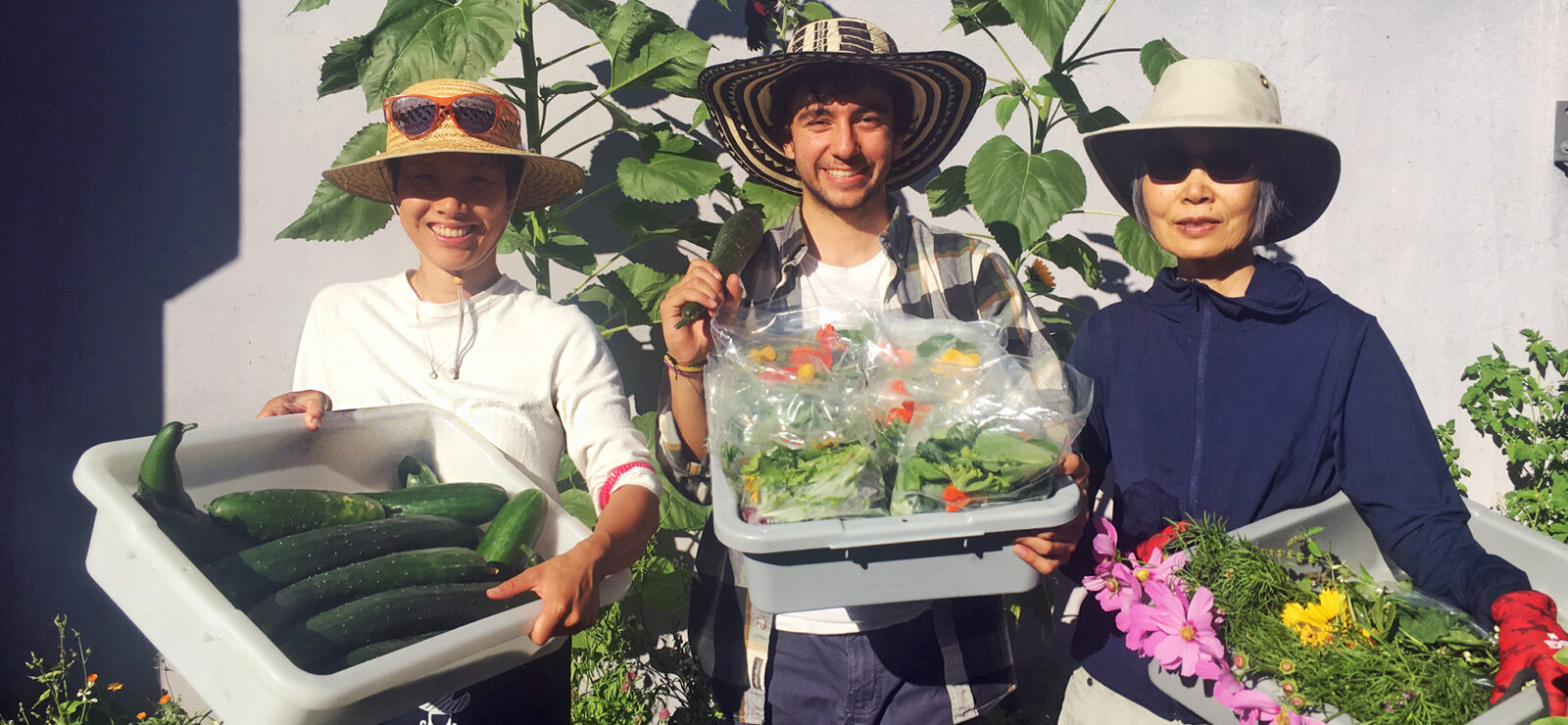
What does food insecurity look like in Canada?
In the 44 years since WFD’s inception, food insecurity has been on the rise in Canada. We could spend all day talking about what food insecurity is (and we have: read more about it in our blog post here), but generally food insecurity happens when people don’t have physical, social, and economic access to sufficient, safe, and nutritious food.
In 2025, more than 1 in 4 Canadians are experiencing food insecurity, over 10 million people. In Canada, a country that wastes 46% of all the food it produces, the main reason that people experience food insecurity is because they can’t afford food. Almost two million Canadians visited a food bank in a single month last year, up 30% from 2023. In September, Food Banks Canada gave the country a ‘D’ grade for its failure to address a 40% rise in food insecurity over the last two years.
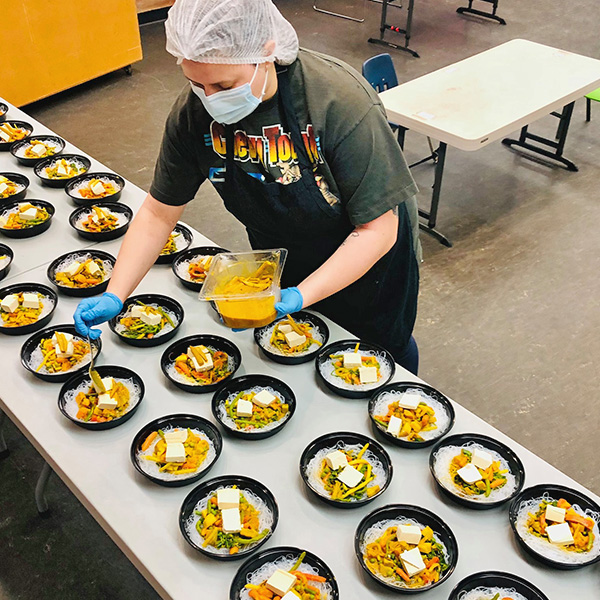
What about the West End?
Looking at our own backyard, 25% of all West End community members are earning wages that fall below Canada’s poverty line. This number is even higher for youth and young adults in the neighbourhood, with over 54% living on incomes far beneath the cost of living.
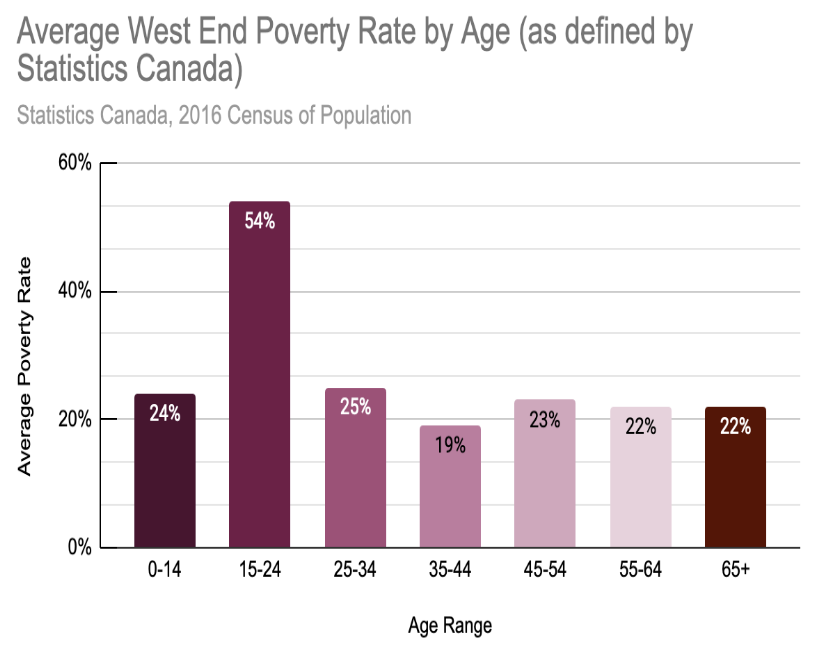
Figure 1. Average West End Poverty Rate by Age (as defined by Statistics Canada). Graph created by Gordon Neighbourhood House. Source: Statistics Canada, 2016 Census of Population.
For many West End neighbours, the high cost of rent gets in the way of their ability to access the nutritious food they need. 49% of renters and 27% of homeowners are spending more than 30% of their income on housing, a benchmark used to assess whether housing is considered “affordable”. This is in combination with the fact that average rent prices have risen by 25% above inflation over the last ten years. Food is often the first to go when you have to choose between so many essential costs, like a place to live, life-saving medications, and childcare.
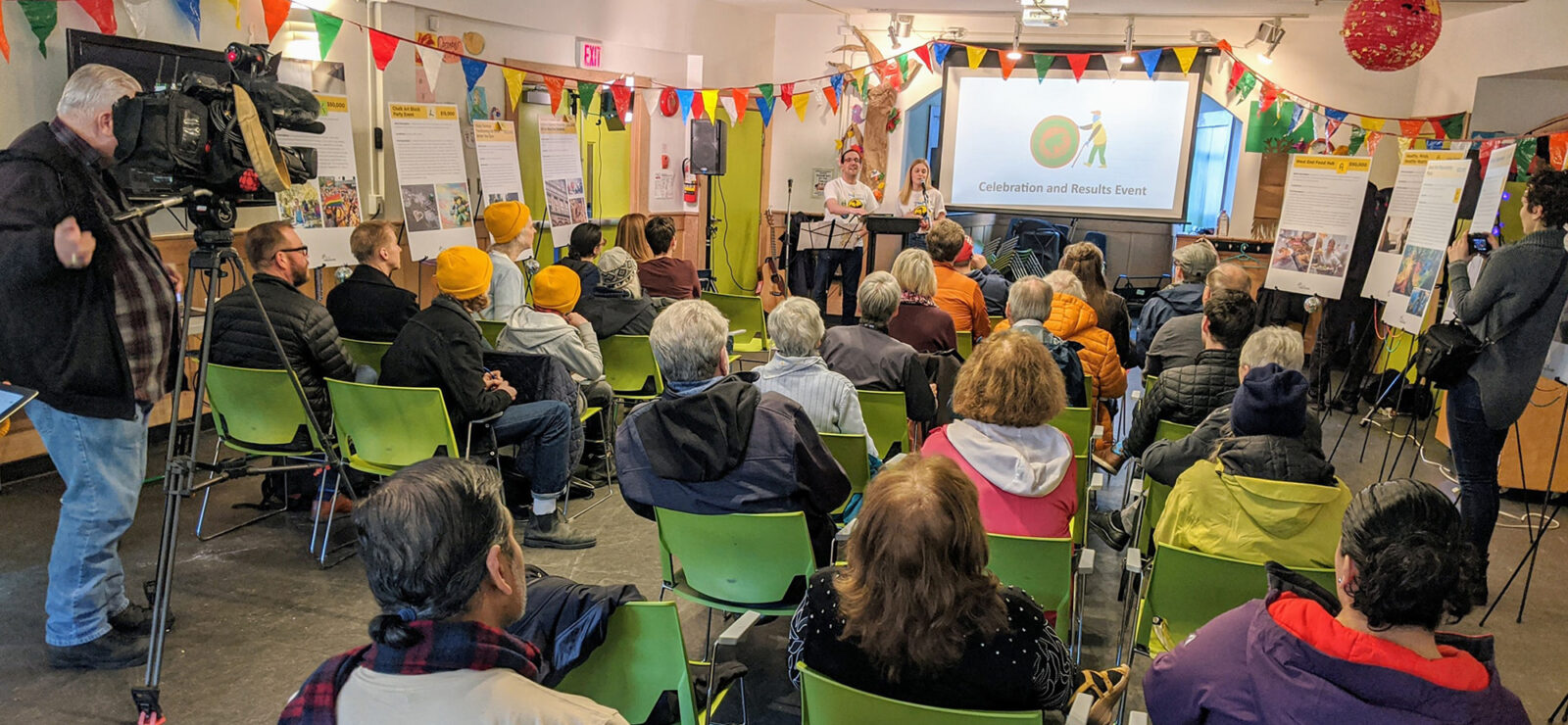
Okay, this is all a lot – what can we do?
While all of this can feel daunting, there is a LOT that we as a country can do to combat injustices in our food system. People in Vancouver, BC, and Canada are calling on all levels of government to take urgent action and make life-saving policy changes that would make a world of difference for our communities. Food Secure Canada sums it up well through their 10 Policy Ingredients for Food Sovereignty (seriously worth reading the whole thing!):
🍎 Expand the National School Food Policy and Program to create a universal program embedded in legislation
🌾 Build food system resilience by expanding Canadian supply management, improve labelling and increasing supports to local markets
💸 Guaranteed livable basic income to ensure no one experiences food insecurity, which can be done through expanding existing benefits programs
⚖️ Break up monopoly power in food retail
✊ Take concrete steps to support Indigenous sovereignty in managing resources and foodways, including implementing the TRC Calls to Action
👩🌾 Reform and improve labour laws ensuring decent work for all and permanent resident status for migrant farmers and factory workers
🥦 Restructure the agriculture sector to benefit farmers, not investors, increasing access to those excluded from land access
🍅 A whole-of-government food policy that invests in local food markets and government procurement
🚂 Remove interprovincial barriers to trade for small and medium sized enterprises growing or trading food, while maintaining regulations that protect workers and the environment
🌎 A Canadian Farm Resilience Agency to provide a home for a wide range of climate change mitigation and adaptation programs and research – build a climate-ready food system
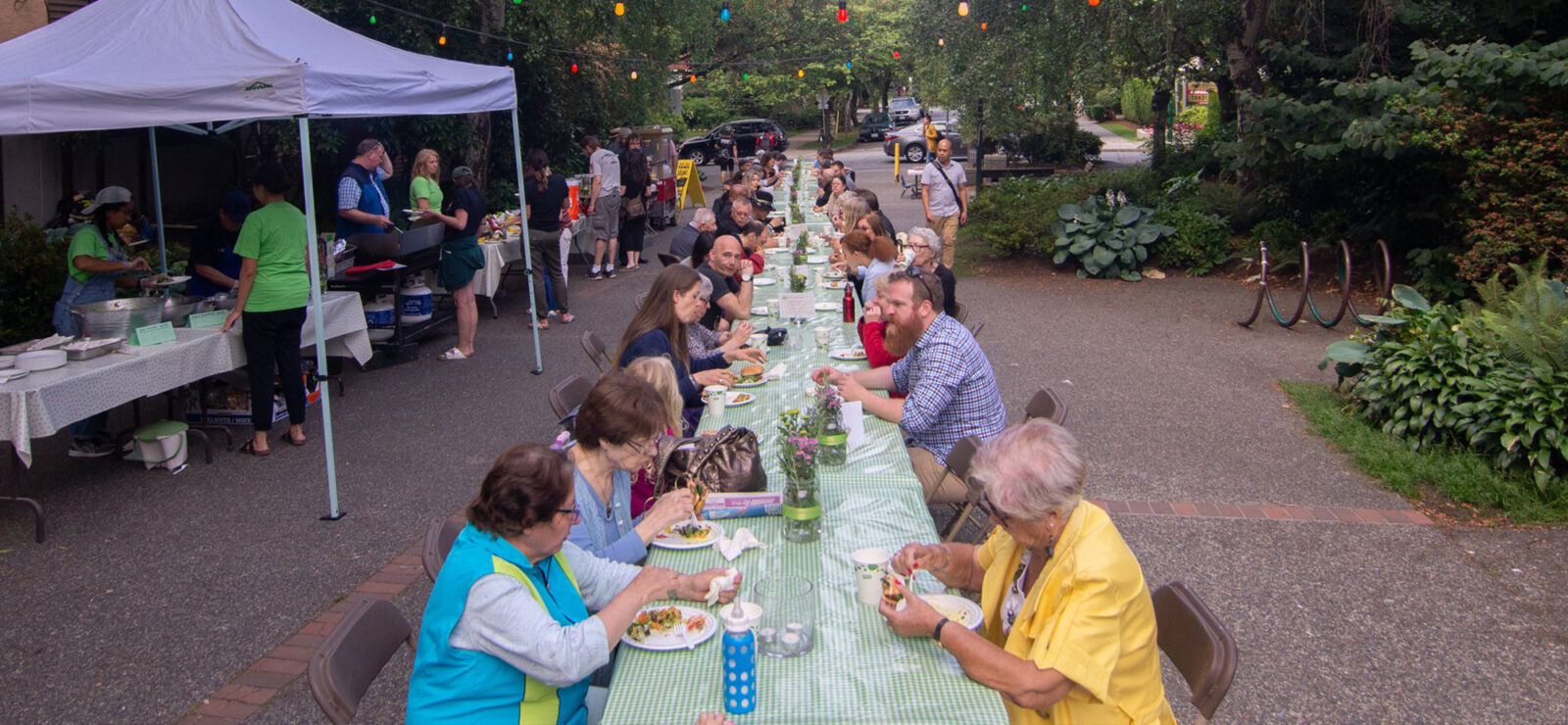
What’s going on for World Food Day in Vancouver?
Got all the way through this post and hungry for more? Check out these awesome events!The Vancouver Sustenance Festival runs all through October and November and there’s tons going on – check out the full event roster for more information.
Growing Voices: Social realities of food in public space
When: October 24, 5pm to 8pm
Location: Roundhouse Community Arts and Recreation Centre
A panel with inspirational leaders discussing the realities of working on cultural food systems at various scales and highlighting the From the Ground Up toolkit for Indigenous food sovereignty strategies.
Lead by Dawn Morrison and including Reuben George, Beatriz Colno Spear, Dr. Charlotte Cote, Mayan Elders, Nazmi Kamal, Kayo Toyin Ajayi.
When: October 18, 2025, from 2:30pm to 4:30pm
Location: The Cultch Historic Theatre
Join us for an unforgettable culinary experience at the Afro Food Salon, a celebration of African descent cuisine and culture. This vibrant event brings together 3 exceptional Afro-diasporic food agents who are redefining the culinary landscape with their passion for food, culture, and community.
Learn to make Quick Pickels and Sauerkraut hosted by Village Vancouver Transition Society
When: October 25, 2025, from 11am to 1pm
Location: Marpole Neighbourhood House, 8585 Hudson St
In this hands-on 2-part workshop with Amy Weeks, parents and children will learn the basics of making a quick pickles and sauerkraut in a mason jar, along with tips and tricks to ensure your pickles turn out crisp and delicious. This workshop is ideal for spaces without access to a stove or full kitchen. All materials provided.
We’ll have a community seed library present and participants can pick up some free seeds for their gardens, or swap or donate seeds.
This is a free event for ages 5 to 11 years. Children must be accompanied by a parent, guardian, or other appropriate adult.
To register, email deedee.nelson@marpolenh.org.
Seed Saving with Pandora Park Community Garden
When: Saturday, November 15, 1pm to 3pm
Location: VPL – Hastings location
An afternoon of group learning about seed saving with a focus on seeds collected at Pandora Park Community Garden throughout this season. Attendees can expect to see and touch the various form of seeds collected from nasturtiums, poppies, calendula to cress and kale. We will talk about how to process and store these seeds and give info about how to harvest and store these seeds.
Happy chomping! 🍐



